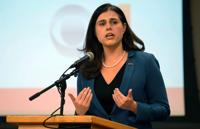Colorado’s economy on solid footing going into 2024, economists say
Confidence in the economy fell heading into 2023 as prices soared and fears of a recession spread.
But as the year ended, Colorado business leaders started to feel more optimistic about the economy, according to the Leeds Business Confidence Index from the University of Colorado Boulder and the Colorado Secretary of State”s office.
Economists at CU Boulder didn’t project a recession last year, but did expect growth to slow, said the university’s business research division senior economist Richard Wobbekind. Still, 2023 exceeded expectations.
Heading into 2024, Colorado’s economy is on a better foundation, according to a quarterly report released Tuesday from the Secretary of State and CU Boulder. The new report covered Colorado’s key economic indicators in the last quarter of 2023.
The national gross domestic product was up 3.4% in the fourth quarter of 2023, the report said, and up 2.5% from the year before.
“That was a far cry from any sort of recession that many had forecasted,” Wobbekind said.
The confidence boost came largely from inflation cooling in the area.
Inflation in the Denver-Aurora-Lakewood region was up 3.5% year-over-year in January, according to the Bureau of Labor Statistics, slightly higher than the national average of 3.1%. While still above normal, inflation in the U.S. has stayed below 4% for eight consecutive months.
Here are a few other highlights from the report:
-
The average Coloradans’ personal income continues to grow at 2.7% year-over-year, but a slower pace than most states, according to the most recent data ending in Q3 2023. Colorado ranks 42nd in income growth and 5th in highest income at $75,722.
- State housing prices are appreciating slower than the rest of the nation, Wobbekind said, but economists see it as a good thing as Colorado struggles with affordability.
- Gasoline prices in the state are down 29% in mid-February from the same time last year.

FILE PHOTO: A photo of Vail Village. The leisure and hospitality sector saw some of the highest job growth in Colorado in 2023, according to CU Boulder economist Richard Wobbekind. But job growth is less widespread across other sectors in the state's economy.
bauhaus1000/iStock.com

FILE PHOTO: A photo of Vail Village. The leisure and hospitality sector saw some of the highest job growth in Colorado in 2023, according to CU Boulder economist Richard Wobbekind. But job growth is less widespread across other sectors in the state’s economy.
A look at the labor market
Colorado’s labor market has stayed strong but is cooling, according to the report.
Employment at the end of the year in Colorado went up less than 1% from the year before and unemployment ticked up to 3.4%.
Yet the state’s ratio of job openings is among the highest in the nation, Wobbekind said.
New job openings were up 17.8% from the third quarter and up 6.9% year-over-year. Colorado had the second highest job opening rate in the nation, the report said.
That’s more than two jobs available for every unemployed Colorado resident, Wobbekind said, and a sign that employers in the state are still struggling to find skilled workers.
The report found job losses within the financial activities, information, and the construction sectors over the year. Job growth was “heavily concentrated” in government, leisure and hospitality and in health services, Wobbekind said.
“Those are all fine sectors and good places for jobs to grow,” Wobbekind said. “But the job growth in the previous years had been spread across more sectors of the economy, including manufacturing, technology and so on.”
Number of new businesses slow, but expected after 2022 boom
When examining the number of new businesses in Colorado, CU Boulder economists said comparing last year to the year before was like comparing apples to oranges.
The number of new business filings dropped 16% in 2023, the report said. That’s because 2022 saw an “abnormal” surge of new businesses from a temporary Secretary of State program that dramatically lowered filing costs to $1.
A more consistent metric — number of businesses in good standing — has gone up 7%, according to the report.
“Colorado businesses are staying in business thanks to the strength of the state’s overall economy,” said Secretary of State Jena Griswold.

FILE PHOTO: Colorado Secretary of State Jena Griswold at a debate in 2022 on the campus of the University of Denver. Griswold said on Tuesday, Feb. 27, 2024 that the number of Colorado businesses in good standing was up 7% at the end of last year, a sign that the economy is doing well.
David Zalubowski/Associated Press

FILE PHOTO: Colorado Secretary of State Jena Griswold at a debate in 2022 on the campus of the University of Denver. Griswold said on Tuesday, Feb. 27, 2024 that the number of Colorado businesses in good standing was up 7% at the end of last year, a sign that the economy is doing well.
What economists are watching for in 2024
State economists are seeing hopeful trends such as wage growth and cooling inflation but there are still some areas they’re concerned about.
One of them is delinquency rates for credit card and auto loans, Wobbekind said. The other is how student loan payments will affect consumer spending.
Another key sector to watch is retail.
“At the state level, we did see a slowing in retail activity sooner than we did nationally,” said Brian Lewandowski, executive director of the Business Research Division at the Leeds School of Business.
Colorado has a higher inflation rate and higher costs of living that might have a bigger impact on consumer spending, Lewandowski said. There’s also a higher property tax bill this year that could hit both homeowner’s and renter’s disposable income.
“That’s another unique headwind for Colorado that hasn’t really been fully felt yet,” Lewandowski said. “It could slow down retailing even further.”






